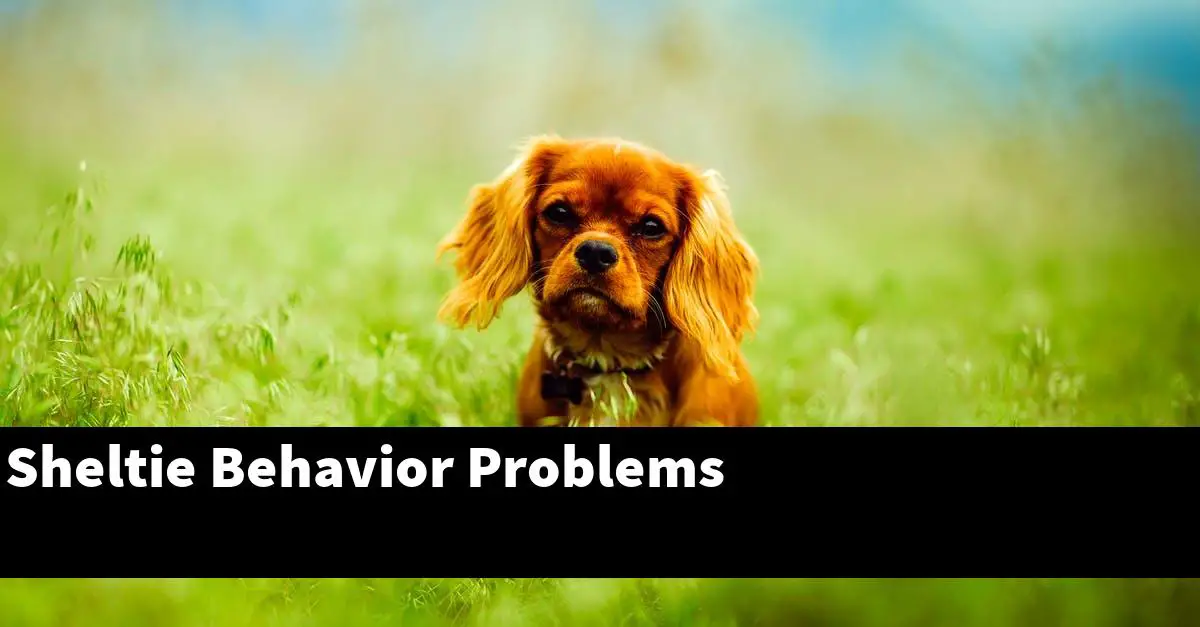Most sheltie behavior problems are caused by either boredom or fear.
Boredom is often the result of too little exercise. Fear can be caused by many things, including loud noises, unfamiliar people or animals, and being left alone.
Many people who own Shelties find that they have some behavior problems. The most common ones include barking, chewing, and digging.
Table of Contents
What are some common sheltie behavior problems?
It is not unusual for Shelties to develop behavior problems. Some of the more common issues include barking, digging, chewing, and separation anxiety.
Barking is often a problem for Shelties, as they are bred to be working dogs. They may bark excessively when they are bored, anxious, or excited. If your Sheltie is barking excessively, it is important to find out the underlying cause and address it. Otherwise, the problem may only get worse.
Digging is another common behavior problem for Shelties. They may dig out of boredom or to escape confinement. If your Sheltie is a digger, it is important to provide him with plenty of exercise and outlets for his energy. Otherwise, the problem may only get worse.
Chewing is another common behavior problem for Shelties. They may chew out of boredom or anxiety. If your Sheltie is a chewer, it is important to provide him with plenty of chew toys and bones. Otherwise, the problem may only get worse.
Separation anxiety is another common behavior problem for Shelties. They may become anxious when left alone. If your Sheltie has separation anxiety, it is important to work with a trainer to help him overcome his fear. Otherwise, the problem may only get worse.
How can I solve sheltie behavior problems?
When it comes to sheltie behavior problems, there are a few things that you can do in order to help your furry friend. First and foremost, it is important to get to the root of the problem. What is causing the sheltie to behave in this way? Once you have determined the cause, you can begin to work on a solution.
One of the best ways to solve sheltie behavior problems is through positive reinforcement training. This type of training focuses on rewarding your sheltie for good behavior, rather than punishing them for bad behavior. By using positive reinforcement, you can help your sheltie to learn what is expected of them and to develop good habits.
If you are unsure of how to go about training your sheltie, there are a number of resources available to help you. There are many books and websites that offer tips and advice on positive reinforcement training. You can also speak to your veterinarian or a professional dog trainer for more help.
With a little patience and effort, you can help your sheltie to overcome their behavior problems and to become a well-behaved dog.
How do you stop a Sheltie from biting?
If you’re having trouble with a biting Sheltie, there are a few things you can do to help stop the behavior. First, make sure that you’re providing your dog with plenty of exercise and mental stimulation.
A bored or frustrated dog is more likely to bite out of frustration or boredom. Secondly, provide your Sheltie with plenty of chew toys and appropriate things to chew on. This will help redirect their chewing behavior away from fingers and toes. Finally, if your dog does bite, make sure to correct the behavior immediately.
Yelling or hitting will only make the problem worse. Be consistent with your training and rewards, and soon your Sheltie will learn that biting is not an acceptable behavior.
Are Shelties skittish?
Yes, Shelties can be skittish. This is because they are bred to be watchdogs, and their natural instinct is to bark at anything that seems out of the ordinary. However, Shelties can also be trained to be calm and not bark excessively.
How do you calm a Sheltie?
A Sheltie is a type of dog that is known for being very active and alert. They are also known for being very vocal, which can sometimes be a problem for owners. If you are finding that your Sheltie is too vocal or too active, there are a few things that you can do in order to calm them down.
The first thing that you should do is to make sure that they are getting enough exercise. A tired dog is a calm dog, so if your Sheltie is full of energy, it is important to make sure that they are getting plenty of exercise. Take them for long walks or runs, and make sure that they have plenty of toys to play with.
If your Sheltie is still too vocal or active, you may want to try a calming supplement. There are a few different supplements on the market that can help to calm a dog down. You should talk to your vet about which supplement would be best for your Sheltie.
Finally, if nothing else seems to be working, you may want to consider training your Sheltie. There are a few different training techniques that you can use in order to teach your Sheltie to be less vocal or active. With a little patience and perseverance, you should be able to train your Sheltie and make them into the calm dog that you want them to be.
Why is my Sheltie so anxious?
There are a number of reasons why your Sheltie may be anxious. It could be due to genetics, past experiences, or even something as simple as a change in routine. Anxiety in dogs can manifest itself in a number of ways, including panting, shaking, pacing, and barking.
If your dog is displaying any of these behaviors, it’s important to take them to the vet to rule out any medical causes. Once any medical causes have been ruled out, you can start to look at other possible causes of your dog’s anxiety. If your dog is anxious due to genetics, there is not much you can do to change that. However, if your dog’s anxiety is due to past experiences or a change in routine, there are a number of things you can do to help ease their anxiety.
For example, you can try to create a calm environment for your dog, give them plenty of exercise, and provide them with plenty of positive reinforcement. If you are unsure of what is causing your dog’s anxiety, or if you are unable to manage their anxiety on your own, it’s important to seek out the help of a professional.
Why are Shelties so skittish?
Shelties, also called Shetland Sheepdogs, are a breed of herding dog that is native to the Shetland Islands off the coast of Scotland. The breed was originally developed to herd sheep and other livestock, but they are now also popular as companion dogs. Shelties are known for their loyalty, intelligence, and trainability, but they can also be skittish and high-strung.
There are several reasons why Shelties may be skittish. First, they are a herding breed, and herding dogs are bred to be alert and aware of their surroundings. This means that they are more likely to be suspicious of strangers and new situations.
Secondly, Shelties are often bred for show, and many show dogs are kept in kennels or other confined spaces. This can make them anxious and stressed, which can lead to skittishness. Finally, Shelties are often bred to be small, and small dogs are often more prone to anxiety and fearfulness.
If you are considering adopting a Sheltie, it is important to be aware of their potential skittishness. Be prepared to provide a calm, stable home environment, and to socialize and train your dog from a young age. With patience and love, your Sheltie can overcome their skittishness and become a loyal, loving companion.
Are Shelties aggressive?
No, Shelties are not aggressive by nature. However, they can become aggressive if they feel threatened or are not properly socialized. It is important to socialize your Sheltie from a young age so that they are comfortable around other people and animals.
Are Shelties protective?
Yes, Shelties are protective. They are bred to be watchdogs, and will often bark at strangers or anything that they perceive as a threat. However, they are not typically aggressive, and will usually back down if the stranger is friendly.
Are Shelties nervous dogs?
No, shelties are not nervous dogs. They are actually very intelligent and loyal companions. However, they can be shy around strangers and may bark excessively if they feel threatened.
Conclusion
The Shetland Sheepdog, or Sheltie, is a breed of herding dog. The breed is best known for its use in sheepdog trials, where they compete with other breeds herding sheep.
While the Sheltie is a generally calm and easy-going breed, they are also known to be very intelligent and easily bored. Without proper stimulation and exercise, they can become anxious and destructive.
Some common behavior problems seen in Shelties include barking, chewing, digging, and chasing. These problems can usually be resolved with proper training and exercise.
If you are considering adding a Sheltie to your family, be sure to do your research and be prepared to provide them with the attention and exercise they need.
The Shetland Sheepdog, or Sheltie, is a great addition to any family. They are intelligent, easy-going, and make great pets. However, they do require some attention and exercise to prevent behavior problems from developing. With proper care, your Sheltie will be a loyal and loving companion for years to come.


